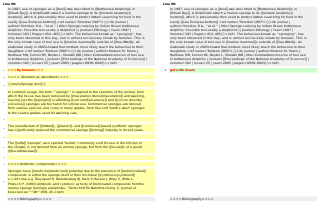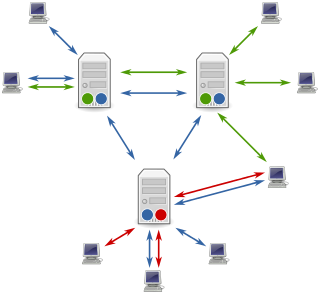Related Research Articles

In internet slang, a troll is a person who posts inflammatory, insincere, digressive, extraneous, or off-topic messages in an online community, with the intent of provoking readers into displaying emotional responses, or manipulating others' perception. This is typically for the troll's amusement, or to achieve a specific result such as disrupting a rival's online activities or manipulating a political process. Even so, Internet trolling can also be defined as purposefully causing confusion or harm to other users online, for no reason at all.
A kill file is a file used by some Usenet reading programs to discard articles matching some unwanted patterns of subject, author, or other header lines. Adding a person or subject to one's kill file means that person or topic will be ignored by one's newsreader in the future. By extension, the term may be used for a decision to ignore the person or subject in other media.

Kremvax was originally a fictitious Usenet site at the Kremlin, named like the then large number of Usenet VAXen with names of the form foovax. Kremvax was announced on April 1, 1984 in a posting ostensibly originated there by Soviet leader Konstantin Chernenko. The posting was actually forged by Piet Beertema of CWI as an April Fool's prank—"because the notion that Usenet might ever penetrate the Iron Curtain seemed so totally absurd at the time".

James Parry, commonly known by his nickname and username Kibo, is a Usenetter known for his sense of humor, various surrealist net pranks, an absurdly long signature, and a machine-assisted knack for "kibozing": joining any thread in which "kibo" was mentioned. His exploits have earned him a multitude of enthusiasts, who celebrate him as the head deity of the parody religion "Kibology", centered on the humor newsgroup alt.religion.kibology.

Leet, also known as eleet or leetspeak, is a system of modified spellings used primarily on the Internet. It often uses character replacements in ways that play on the similarity of their glyphs via reflection or other resemblance. Additionally, it modifies certain words based on a system of suffixes and alternate meanings. There are many dialects or linguistic varieties in different online communities.
A Usenet newsgroup is a repository usually within the Usenet system, for messages posted from users in different locations using Internet. They are discussion groups and are not devoted to publishing news. Newsgroups are technically distinct from, but functionally similar to, discussion forums on the World Wide Web. Newsreader software is used to read the content of newsgroups.
A signature block is a personalized block of text automatically appended at the bottom of an email message, Usenet article, or forum post.

There are a number of disputes concerning the Church of Scientology's attempts to suppress material critical of Scientology on the Internet, utilizing various methods – primarily lawsuits and legal threats, as well as front organizations. In late 1994, the Church of Scientology began using various legal tactics to stop distribution of unpublished documents written by L. Ron Hubbard. The Church of Scientology is often accused of barratry through the filing of SLAPP suits. The official church response is that its litigious nature is solely to protect its copyrighted works and the unpublished status of certain documents.
The newsgroup alt.religion.scientology is a Usenet newsgroup started in 1991 to discuss the controversial beliefs of Scientology, as well as the activities of the Church of Scientology, which claims exclusive intellectual property rights thereto and is viewed by many as a dangerous cult. The newsgroup has become the focal point of an aggressive battle known as Scientology versus the Internet, which has taken place both online and in the courts.
Serdar Argic was the alias used in one of the first automated newsgroup spam incidents on Usenet, with the objective of denying the Armenian genocide.

A news server is a collection of software used to handle Usenet articles. It may also refer to a computer itself which is primarily or solely used for handling Usenet. Access to Usenet is only available through news server provider.
Sporgery is the disruptive act of posting a flood of articles to a Usenet newsgroup, with the article headers falsified so that they appear to have been posted by others. The word is a portmanteau of spam and forgery, coined by German software developer, and critic of Scientology, Tilman Hausherr.

An Internet forum, or message board, is an online discussion site where people can hold conversations in the form of posted messages. They differ from chat rooms in that messages are often longer than one line of text, and are at least temporarily archived. Also, depending on the access level of a user or the forum set-up, a posted message might need to be approved by a moderator before it becomes publicly visible.
Newsgroup spam is a type of spam where the targets are Usenet newsgroups.
When a message is replied to in e-mail, Internet forums, or Usenet, the original can often be included, or "quoted", in a variety of different posting styles.
Google Groups is a service from Google that provides discussion groups for people sharing common interests. The Groups service also provides a gateway to Usenet newsgroups via a shared user interface.
A Usenet personality was a particular kind of Internet celebrity, being an individual who gained a certain level of notoriety from posting on Usenet, a global network of computer users with a vast array of topics for discussion. Since its inception, Usenet newsgroups have attracted a wide variety of people posting all manner of fact, fiction, theories, opinions, and beliefs. Some Usenet posters achieved a certain amount of fame and celebrity within Usenet circles because of their unusual, non-mainstream ideas, or because their writings and responses are considered especially humorous or bizarre.

Usenet is a worldwide distributed discussion system available on computers. It was developed from the general-purpose Unix-to-Unix Copy (UUCP) dial-up network architecture. Tom Truscott and Jim Ellis conceived the idea in 1979, and it was established in 1980. Users read and post messages to one or more categories, known as newsgroups. Usenet resembles a bulletin board system (BBS) in many respects and is the precursor to Internet forums that became widely used. Discussions are threaded, as with web forums and BBSs, though posts are stored on the server sequentially.
Shadow banning, also called stealth banning, ghost banning or comment ghosting, is the practice of blocking or partially blocking a user or their content from an online community so that it will not be readily apparent to the user that they have been banned. For instance, shadow banned comments posted to a blog or media website will not be visible to other users accessing the site.
The Meow Wars were an early example of a flame war sent over Usenet which began in 1996 and ended circa 1998. Its participants were known as "Meowers". The war was characterized by posters from one newsgroup "crapflooding", or posting a large volume of nonsense messages, to swamp on-topic communication in other groups. Ultimately, the flame war affected many boards, with Roisin Kiberd wrote in Motherboard, a division of Vice, that Internet vocabulary was created as a result of the Meow Wars.
References
- ↑ "plonk". The Jargon File.
- 1 2 "The first *plonk*". Richard Sexton, VRx. 25 February 2008. Archived from the original on 20 August 2008. Retrieved 2008-02-25.
- ↑ Google Groups search
- ↑ alt.flame archived by Google Groups
